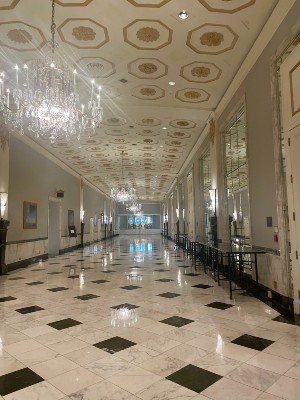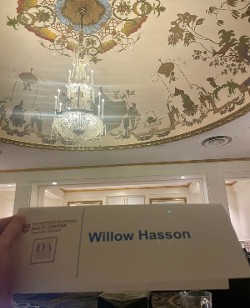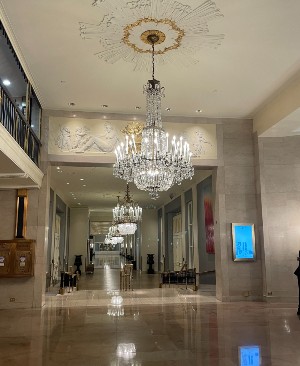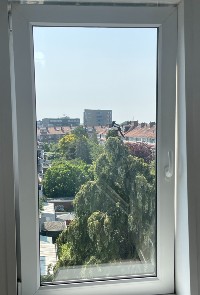The D.C. “Democratic Backsliding” Conference & Travel
The "Democratic Backsliding Conference," hosted by International IDEA and the Malyi Center (a new research center from UChicago Law), took place at the Mayflower Hotel. The Mayflower Hotel is known as the “President’s Hotel” because of how many U.S. presidents have stayed there. Luckily, Anna (the other intern) and I got to stay at the hotel and were present for the whole conference so that we could take notes for International IDEA’s future report. Conference meetings took place in the “Chinese Room” which is where President Nixon met with the Chinese government in 1973 to establish a Chinese Embassy. It was exciting to be in such a historic room.
Conference meetings took place in the “Chinese Room” which is where President Nixon met with the Chinese government in 1973 to establish a Chinese Embassy. It was exciting to be in such a historic room. The conference had about thirty total participants representing countries with research and experience from Mexico, Israel, Chile, Barbados, Belize, Armenia, England, Australia, Italy, Sweden, Argentina, Scotland, South Africa, Sri Lanka, the U.S., and more. The structure of the conference's sessions involved a presentation about two different countries followed by questions, answers, and an open discussion. The first topic was about framing the issue of “democratic backsliding” and many of the participants considered how “democratic decay” or “hollowing out” could be a less misleading term since many of the democracies that are now in crisis have different histories of stability and instability. International IDEA led this discussion with the Malyi Center, which was followed by the more substantive topic of constitution building. The group discussed topics like how term limits for a Prime Minister are rare, and the UN worker from South Africa added knowledge about how term limits work well there. This exchange was a great example of how bringing together people from such different governmental structures and knowledge bases can reveal what new changes are possible and how feasible they are.
The conference had about thirty total participants representing countries with research and experience from Mexico, Israel, Chile, Barbados, Belize, Armenia, England, Australia, Italy, Sweden, Argentina, Scotland, South Africa, Sri Lanka, the U.S., and more. The structure of the conference's sessions involved a presentation about two different countries followed by questions, answers, and an open discussion. The first topic was about framing the issue of “democratic backsliding” and many of the participants considered how “democratic decay” or “hollowing out” could be a less misleading term since many of the democracies that are now in crisis have different histories of stability and instability. International IDEA led this discussion with the Malyi Center, which was followed by the more substantive topic of constitution building. The group discussed topics like how term limits for a Prime Minister are rare, and the UN worker from South Africa added knowledge about how term limits work well there. This exchange was a great example of how bringing together people from such different governmental structures and knowledge bases can reveal what new changes are possible and how feasible they are.
After the break, the next session started with a discussion on Mexico and then on Israel. The law professor from the National University of Mexico discussed the government policies that had undermined democracy in Mexico, including electoral reform, austerity measures, and the militarization of the state. The law professor from Tel Aviv University then discussed how the democracy in Israel was eroded by a blitz of legislation. She posed the question to the group: is the current crisis a “constitutional moment?” (which is part of Bruce Ackerman’s theory that I had learned about in Constitutional Law at W&M).
The rest of the day, I had the chance to learn about Chile, Barbados, Belize, and Armenia, which were discussed under the topic of “constitutional reform processes.” Then, the group focused on “militant democracy” with talks from a professor from the New York University School of Law (who was originally from Argentina) and from the National Democratic Institute. The discussion surrounded new ideas on how to prevent democratic erosion, the rise of populism worldwide, and how different forms of presidential term limits can make a difference.
The first day ended with dinner for the full group in the Mayflower Hotel, followed by after-dinner drinks at the hotel's "Edgar Bar." I had the opportunity to join discussions on concepts like originalism in the U.S., the racial dynamics of jury trials (South Africa abolished them in 1969), theories about how to support first-generation students, and how many of the participants had gotten into their fields of work. Just at the one dinner table, there were stories from Sri Lanka, Sweden, England, Mexico, Australia, Scotland, and different U.S. states. Hearing participants’ stories brought a sense of personal connection to the deeply researched topics that had been discussed during the day.
The following day of the conference opened with a focus on how all of the U.S. states have constitutions that change frequently. The first discussion leader presented research on the democratic decline within states like Wisconsin, which has seen dramatic gerrymandering in recent history. The next part of the discussion covered “counter-majoritarian measures” and discussed: the U.S. presidential elections, how the rigidity of amending constitutions can help or hinder democracy, how judicial power can hurt or protect democracy (with a discussion of Venezuela and Ecuador), and the judicial power dynamics in India (with a presentation from a law professor from the University of Melbourne).
The final session ended with a reflection on how international organizations have and can keep making a difference. The discussions emphasized new ideas for the diversity of data and expanding what external actors are used to help protect elections and democracies in general. Many of the participants left the conference with plans to fly to other conferences around the world before returning home. Being in a room with so many fascinating people was so rewarding and made me excited for my flight the next day to the Netherlands!
I spent the next two days traveling to Amsterdam and adjusting to the jet lag of a new time zone. My first flight was delayed and would’ve made me miss my connecting flight to Amsterdam, but luckily the DCA airport staff transferred me to a direct flight out of Dulles instead. Once in Amsterdam, I took a train right from the Schipol Airport to The Hague, then went to my Airbnb in a suburban village called “Voorburg,” where I’ll be staying for the summer with Anna as my roommate.
 The conference was overall an incredible experience that I feel so lucky to have been part of. Having background knowledge of the work that International IDEA does showed me how deep the impact of these organizations can be. Getting to be a part of that work in The Hague is such a special opportunity that I can’t wait to cherish.
The conference was overall an incredible experience that I feel so lucky to have been part of. Having background knowledge of the work that International IDEA does showed me how deep the impact of these organizations can be. Getting to be a part of that work in The Hague is such a special opportunity that I can’t wait to cherish.